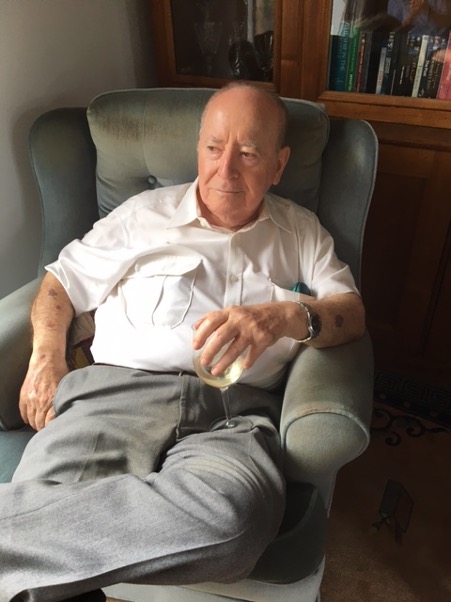Vale Tom Hegarty
20 September, 2023

Tom Hegarty, an admired pioneer of Australian television writing, has died in Sydney at the age of 88.
In an era when dramatic writing was not considered a proper career, Tom wrote in the evenings while working as a traveling salesman for Lever Brothers in Queensland. Like many in the 1960s, Tom got his first break in radio drama, though to do this he had to take his young family with him to London. Finding success with the BBC, Tom returned in 1967 to join Crawford Productions.
With Crawford cop shows, Homicide, Division 4 and Matlock Police competing with each other on the three commercial channels, Hector and Dorothy’s production house was, along with the ABC, the only place where writers received any training and Tom Hegarty became one of their most thoughtful and generous mentors. Tom went on to give guidance and encouragement to many writers throughout their careers, and I was lucky enough to be one of them.
Back then, working for ‘the family’ was the only place for a young writer to be and staff contracts were highly sought after. We were rated like journalists from C to Super A and worked our way up the pay-scale, expected to write eight scripts a year with a bonus for anything after that. Tom was one of the system’s designers.
Tom eventually went freelance, although, like many, he had difficulty in leaving the family. Crawford Productions was like the Costa Nostra; they invested in your development and expected you to return the favour. He briefly left to work on the ABC mega-series Power Without Glory with Cliff Green, Howard Griffiths, Sonia Borg and myself – all ex-Crawford’s writers – but was persuaded by Hector to return when he threatened to break his legs.
During his time at Crawford’s, Tom worked as a writer, script editor and producer on all the cop shows and series ranging from Hunter, The Box (which he co-devised with Ian Jones), Young Ramsay, Bluey, and The Flying Doctors. Tom was a showrunner before we knew what the term meant.
When Tom eventually left Crawford’s for good, he flourished in the freelance world, working with Ian Jones on Against The Wind and Ian’s feature, The Lighthorsemen. Tom also worked on Henry Crawford’s A Town Like Alice, co-writing with Rosemary Anne Sissons on one of Australia’s first British co-productions. Starring Helen Morse and Bryan Brown, the highly acclaimed miniseries won Tom an AWGIE. His other credits included Eureka Stockade, Five Mile Creek, E Street, Snowy, Halifax f.p., The Man From Snowy River, All Saints, Blue Heelers and Stingers.
Tom also spent time serving as Head of the Writing Workshop at the AFTRS and as Director of Scripts at the AFC.
Over the years, Tom remained my adviser, guiding me and many others through the shark infested waters we call the industry, blinded as we are by the shimmering light on top. His sage advice was always in mind: ‘don’t make waves and don’t look down.’
We became firm friends and tennis buddies for many years, playing with Howard Griffiths, Peter Kinloch and Graeme Koetsveld and drinking red wine long after the game as we continued to dispute our line calls.
But it was Tom’s work as an editor I will always remember and value. He’d write his notes like riddles. Why did you do that? What were you thinking here? For God’s sake – what is it you are trying to say? Always the questions and never the answers, the best kind of editorial input. Tom interrogated and challenged his writers to explore their ideas rather than make left-field suggestions that took them away from their concept. Tom edited from the outside in.
Tom was widely read and loved to give books as gifts. His love of language and his knowledge of scripts, plays and literature were key to his insight as an editor. He had devoured the masters and savoured and remembered every word.
Tom was an active Guild member in the early days, though he resigned over a policy disagreement and sadly never returned. But he remained active and passionate about the industry throughout his long career.
As writers get older and lunches get longer, our companions are thinning out too. Of Tom’s various lunching mates, there’s probably only Geoffrey Atherden, Laura Jones, Angela Wales Kirgo, Rick Maier, Simon Hopkinson, Barry Oakley, David Allen and me left to chew the fat and reminisce. And Crawford’s feels like something from the black and white days which it was. Tom loved to tell the story about when colour was introduced and Hector called the writers into his office. ‘But can you write colour?’ Hec asked with concern. ‘Yes,’ said Cliff Green, ‘we’ve been doing it all along.’
Many writers are respected for their work or admired for their efforts on behalf of the Guild. Others are sought out for the wonderful stories they tell about the old days or their generosity of spirit with those trying to forge a career. Tom was all of that – but something else too: Tom was loved. ‘We had the best of it,’ he’d say, quoting ‘Dead Howard’ (we called him that as he was the first of the group to bail out), but every generation thinks that.
Though they were only the golden years to us, I am grateful I could share them with Tom. Great writer, consummate editor, middling tennis player, ferocious bibliophile and peerless friend, Tom Hegarty died as he wanted: at home with his extensive library of books. We will miss him more than words can say.
– Roger Simpson
Photo credit: Angela Wales Kirgo


